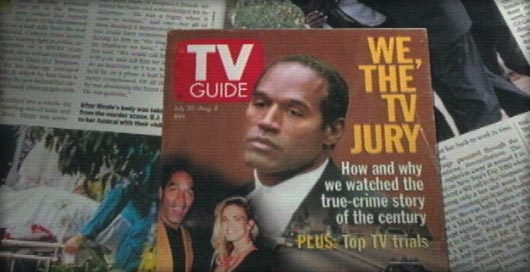
» About the Film:
In The O.J. Verdict, FRONTLINE examines what began as a double homicide in 1994 near Santa Monica, Calif., and quickly became a media mega-story. In the 372 days that the O.J. Simpson murder trial lasted, television recorded, discussed and analyzed the proceedings. Public opinion polls showed that America quickly polarized along racial lines. "Most white Americans believed Simpson was obviously guilty before the trial ever started, [and] most white Americans feared that the defense would do something unethical and use racism to get a predominantly African American jury to acquit an obviously guilty defendant," says UCLA law professor and former ABC News consultant, Peter Arenella. Marc Watts, who was a correspondent with CNN at the time and one of the few African Americans covering the trial, says, "[In] the trial, everything is about race. Black people deal with race everyday. Whites who said it's not a trial about race speak that way because they haven't been on the receiving end of injustices at the hands of a white person."
The FRONTLINE documentary, The O.J. Verdict, examines both the trial and the explosive reaction that erupted afterward along racial lines: black men and women celebrating victory in the streets, while outraged white Americans decried a miscarriage of justice. Ten years afterward, as the documentary shows, the verdict still evokes heated and disparate opinions.
For classes in Social Studies, American Government, Current Events, Language Arts, Media Studies. Grade level 9th - 12th.
» A Note to Teachers:
Discussing race in the classroom poses enormous challenges since students are often reluctant to speak openly if they are afraid of insulting other classmates or being misunderstood. Before watching the documentary, students and their teacher should discuss what rules they would like to establish for discussing the difficult issues surrounding race. How can students agree to deal with an uncomfortable moment or with someone who says something inappropriate?
Teachers can find useful guidelines for "Facilitating Discussions on Racism, Prejudice, and Discrimination" in the FRONTLINE Teacher's Guide for another documentary: A Class Divided. The link to these guidelines for discussion is: http://www.pbs.org/wgbh/pages/frontline/teach/divided/assignment1.html#note
A list of questions focusing on media awareness for students to discuss before viewing the film.
» Featured Lesson Plan:
Re-Creating The Era Of The Trial
Students will:
- Become familiar with the main points of the accusation against O.J. Simpson and the prosecution and defense strategies
- Become familiar with the issues of race that lie behind the trial and the reaction to the verdict
» Additional Lesson Ideas:
Examining Race through Poetry
Through irony and understatement, Langston Hughes's poem, "Dinner Guest: Me," invites an examination of the relationship between blacks and whites in America.Creative Responses to Invisible Man
This lesson invites imaginative responses (poems, spoken word, music, art) to quotations from Invisible Man by Ralph Ellison, a novel that traces, through its main character, the choices open to African Americans during the 20th century.Parallels and Differences: Exploring the Rodney King Trial
Students interested in law and legal history can explore the 1992 Rodney King trial for parallels and differences to the issues of the O. J. trial.
» Purchasing the Film:
The O.J. Verdict can be purchased from Shop PBS for Teachers. Also, teachers and students can watch the film streamed in its entirety on FRONTLINE's Web site.
» Credits
This teacher's guide was developed by Simone Bloom Nathan of Media Education Consultants. It was written by Ellen Greenblatt of University High School, San Francisco. Advisers were Patricia Grimmer of Carbondale High School, Carbondale, Ill.; Debra Plafker Gutt, Stuyvesant High School, N.Y.; and Greg Timmons, curriculum writer/educational consultant.
home » previous reports » watch online » about us » teacher center » newsletter » email FRONTLINE
privacy policy » wgbh » pbsi
new content copyright ©1996-2004 pbs online and wgbh/frontline